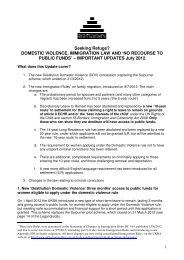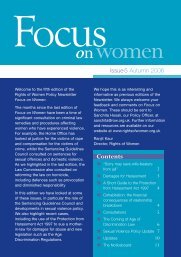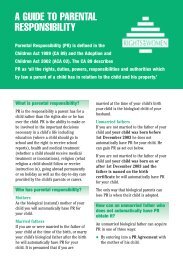Seeking Refuge? - Rights of Women
Seeking Refuge? - Rights of Women
Seeking Refuge? - Rights of Women
You also want an ePaper? Increase the reach of your titles
YUMPU automatically turns print PDFs into web optimized ePapers that Google loves.
Would you be safe anywhere<br />
else? Internal relocation<br />
When considering your claim for protection, the<br />
decision-maker will consider whether you would be<br />
safe from the harm you fear in another part <strong>of</strong> your<br />
country. This is called internal relocation or the<br />
internal flight alternative.<br />
Internal relocation is more likely to be an issue in<br />
your case if you fear persecution from non-State<br />
actors who live in a specific area, such as family<br />
members or criminal gangs who know where you<br />
are. It may be that you would be safe from people<br />
like this if you moved to another part <strong>of</strong> your<br />
country.<br />
When deciding whether you should move<br />
somewhere else in your country, rather than being<br />
given protection in the UK, the decision-maker<br />
should consider whether:<br />
• there is another part <strong>of</strong> the country where you<br />
could go that would be safe; and, if there is:<br />
• whether it would be very unfair to expect you<br />
to go and stay there. The legal test used is<br />
whether or not it would be “unduly harsh” 2<br />
to expect you to move.<br />
When considering whether or not it would be<br />
unduly harsh for you to move to a different area<br />
<strong>of</strong> your country, the decision-maker should<br />
consider the financial, practical, social and cultural<br />
factors that affect the ability <strong>of</strong> women to move<br />
to a different area. This means that they should<br />
consider where you would live, how you could<br />
find somewhere safe and how you would be able<br />
to support yourself.<br />
Example <strong>of</strong> a case: AA (Uganda)<br />
[2008] 3<br />
In this case, the Court <strong>of</strong> Appeal held that it<br />
would be unduly harsh for AA, a woman who<br />
had experienced physical and sexual violence,<br />
to move to a different area in Uganda when<br />
she had no family or other support and may<br />
have to enter into prostitution to support<br />
herself.<br />
The Convention Reasons<br />
The <strong>Refuge</strong>e Convention does not protect people<br />
from general threats to their safety, such as<br />
threats that come from a war or a flood. Instead,<br />
you have to show that you fear persecution for<br />
one, or more, <strong>of</strong> the following Convention<br />
reasons:<br />
• race;<br />
• religion;<br />
• nationality;<br />
• political opinion; and / or<br />
• membership <strong>of</strong> a “particular social group”.<br />
Your race is your skin colour or your membership<br />
<strong>of</strong> a particular ethnic group or clan. A person may<br />
be persecuted because <strong>of</strong> their race by others <strong>of</strong> a<br />
different race to them. <strong>Women</strong> may be<br />
persecuted because <strong>of</strong> their role in having<br />
children. For example, women may be raped by<br />
members <strong>of</strong> another racial group to punish them,<br />
and so that they have children who are members<br />
<strong>of</strong> that other racial group.<br />
Your religion is the beliefs that you have about<br />
whether or not there is a god or gods.<br />
Christianity, Hinduism, Islam, Judaism and Sikhism<br />
all involve believing in a god or gods, while other<br />
religious beliefs, such as humanism or ancestor<br />
worship do not involve a god. A person may be<br />
persecuted for their religious beliefs when their<br />
beliefs are different to those <strong>of</strong> their State, where<br />
they have changed their religion, or where they<br />
have no religion at all. <strong>Women</strong> may be persecuted<br />
for not following the rules <strong>of</strong> a religion.<br />
Your nationality is your membership <strong>of</strong> a<br />
particular State or group. For example, a person<br />
born in Britain to British parents will be British.<br />
Your nationality may be determined by the place<br />
you were born, or it may be linked to other things<br />
such as your culture, ethnicity, language or<br />
political opinion. An example <strong>of</strong> someone who is<br />
persecuted for their nationality could be a woman<br />
who is punished for encouraging people who<br />
share her language and culture to set up their<br />
own country, or form links with another country<br />
which also shares her language and culture.<br />
Your political opinions are your opinions, thoughts<br />
or beliefs on particular issues. Some examples <strong>of</strong><br />
expressions <strong>of</strong> political opinion are:<br />
2<br />
AH (Sudan) v Secretary <strong>of</strong> State for the Home Department [2007] 3 WLR 832<br />
3 AA (Uganda) v Secretary <strong>of</strong> State for the Home Department [2008] EWCA Civ 579<br />
13
















